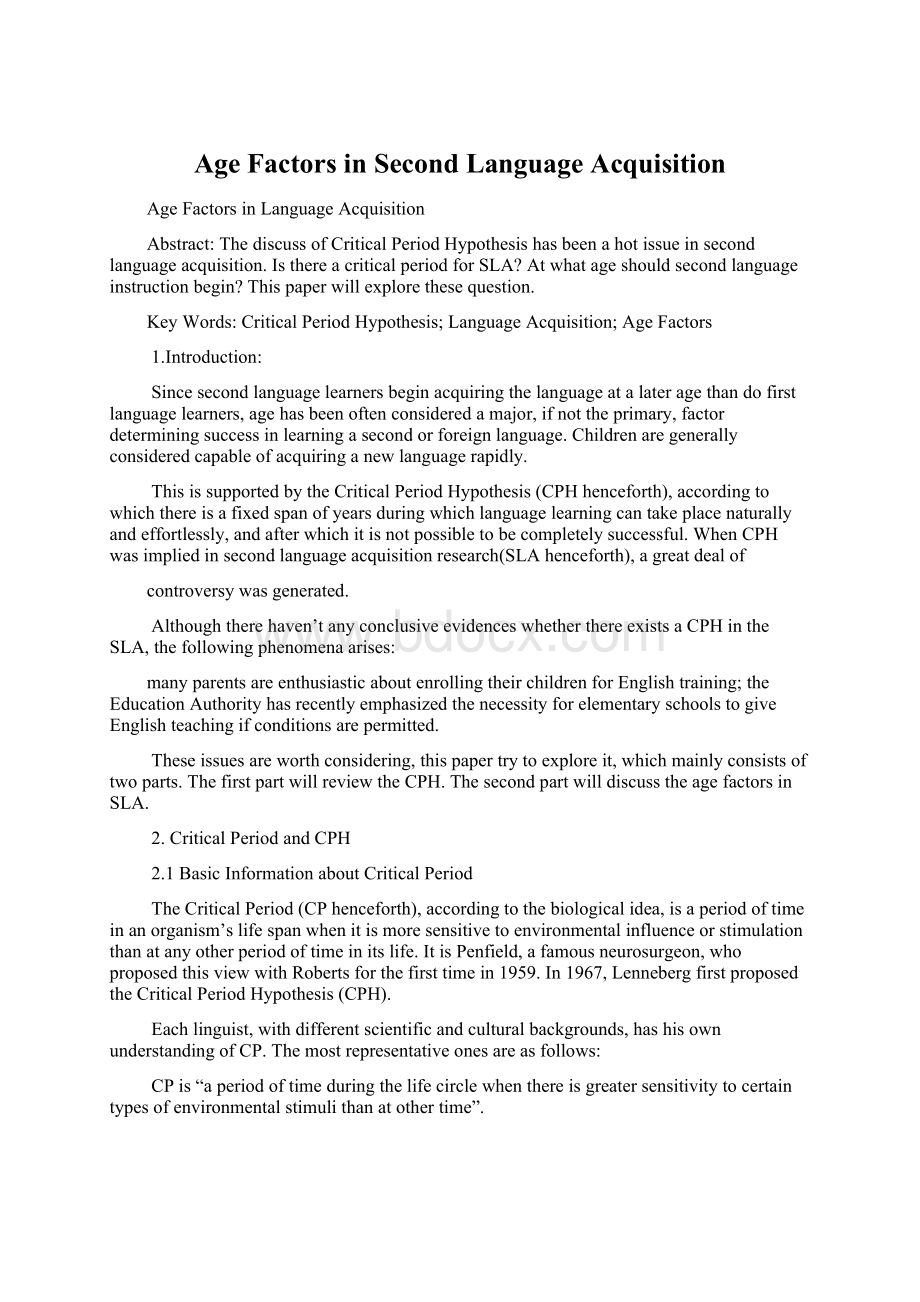Age Factors in Second Language AcquisitionWord文档下载推荐.docx
《Age Factors in Second Language AcquisitionWord文档下载推荐.docx》由会员分享,可在线阅读,更多相关《Age Factors in Second Language AcquisitionWord文档下载推荐.docx(5页珍藏版)》请在冰豆网上搜索。

Thispaperwillexplorethesequestion.
KeyWords:
CriticalPeriodHypothesis;
LanguageAcquisition;
AgeFactors
1.Introduction:
Sincesecondlanguagelearnersbeginacquiringthelanguageatalateragethandofirstlanguagelearners,agehasbeenoftenconsideredamajor,ifnottheprimary,factordeterminingsuccessinlearningasecondorforeignlanguage.Childrenaregenerallyconsideredcapableofacquiringanewlanguagerapidly.
ThisissupportedbytheCriticalPeriodHypothesis(CPHhenceforth),accordingtowhichthereisafixedspanofyearsduringwhichlanguagelearningcantakeplacenaturallyandeffortlessly,andafterwhichitisnotpossibletobecompletelysuccessful.WhenCPHwasimpliedinsecondlanguageacquisitionresearch(SLAhenceforth),agreatdealof
controversywasgenerated.
Althoughtherehaven’tanyconclusiveevidenceswhetherthereexistsaCPHintheSLA,thefollowingphenomenaarises:
manyparentsareenthusiasticaboutenrollingtheirchildrenforEnglishtraining;
theEducationAuthorityhasrecentlyemphasizedthenecessityforelementaryschoolstogiveEnglishteachingifconditionsarepermitted.
Theseissuesareworthconsidering,thispapertrytoexploreit,whichmainlyconsistsoftwoparts.ThefirstpartwillreviewtheCPH.ThesecondpartwilldiscusstheagefactorsinSLA.
2.CriticalPeriodandCPH
2.1BasicInformationaboutCriticalPeriod
TheCriticalPeriod(CPhenceforth),accordingtothebiologicalidea,isaperiodoftimeinanorganism’slifespanwhenitismoresensitivetoenvironmentalinfluenceorstimulationthanatanyotherperiodoftimeinitslife.ItisPenfield,afamousneurosurgeon,whoproposedthisviewwithRobertsforthefirsttimein1959.In1967,LennebergfirstproposedtheCriticalPeriodHypothesis(CPH).
Eachlinguist,withdifferentscientificandculturalbackgrounds,hashisownunderstandingofCP.Themostrepresentativeonesareasfollows:
CPis“aperiodoftimeduringthelifecirclewhenthereisgreatersensitivitytocertaintypesofenvironmentalstimulithanatothertime”.
ThereisalimiteddevelopmentalperiodduringwhichitispossibletoacquireaLanguage,“oncethisperiodoftimeispassed,however,theabilitytolearnlanguagedeclines”.
“Innatebehaviorsareoftendistinguishedbytheexistenceofacriticalperiodduringwhichtheabilitytoacquirethecompetencereachesitspeak,thereafter,theabilitytoacquirethatcompetencedeclines”.(HarleyandHart,1997:
163)
Often,the“periodoftime”,mentionedinthethreedefinitionabove,referto“periodfrombirthtopuberty”.Puberty,inthedictionary,isdefinedas:
Thestageofadolescenceinwhichanindividualbecomesphysiologicallycapableofsexualreproduction(Generally,maleisabout14yearsoldandthefemaleis12yearsold)orthetendencyfortheleftsideandtherightsideofthebrainandthebodytodevelopdifferentfunctions.
2.2LennerbergandCriticalPeriodhypothesis(CPH)
In1967,afterexaminingalargequantityofexamplesofbrainchangesinearlylife,LenneberglinkedCPtomaturationalchilddevelopment,especiallytothedevelopmentofspeechandlanguage.Hesuggestedthatpubertywasthestop-pointofageforcompletelysuccessfulprimarylanguageacquisitionanditwasalsotheagewhenforeignaccentappeared.ThenhepostulatedaCPforlanguageacquisition,andthisistheCritical
PeriodHypothesis(CPH).InhisfamousworkBiologicalFoundationofLanguage,wasformulatedasfollows:
“Thuswemayspeakofacriticalperiodforlanguageacquisition.Atthebeginningitislimitedbylackofmaturation.Itsterminationseemstoberelatedtoalossofadaptabilityandinabilityforreorganizationinthebrain,particularlywith
respecttothetopographicalextentofneuropsychologicalprocesses......Thelimitationinmanmaywellbeconnectedwiththepeculiarphenomenonofcerebrallateralizationoffunction,whichonlybecomesirreversibleaftercerebralgrowthphenomenacometoConclusion.”(Lenneberg1967,179)
Lennebergtheorizedthattheacquisitionoflanguageisaninnateprocessdeterminedbybiologicalfactors,whichlimitthecriticalperiodfortheacquisitionofalanguagefromroughlytheageoftwotopuberty.Lennebergbelievedthatafterlateralizationorpuberty(aprocessbywhichtheleftandtherightsidesofthebraindevelopspecializedfunctions),thebrainlosesplasticity.Lennebergclaimedthatlateralizationofthelanguagefunctionisnormallycompletedatpuberty,makingpost-adolescentlanguageacquisitiondifficult.CPHthuswonthefirstplaceofthemostsignificanttopicsinthelinguisticfield.
3.DiscussiononageFactorsinLanguageAcquisition
IsthereacriticalperiodforSLA?
Whataretherelationshipsamongbeginningage,lengthoflearningandsecondlanguagelearning?
Experimentsshowthatatthebeginningoflanguagedevelopment,bothhemispheresareequallyinvolvedinlanguagelearning.Thedominancephenomenonseemstocome
aboutthroughaprogressivedecreaseininvolvementoftherighthemisphereandthelefthemispherebecomesthemajorbeareroflanguagefunctions.Butduringthisepipotentialperiod,therighthemisphereisalsoabletotakeonspeechandlanguagefunctions.
Hemispherectomydatashowthatifachildhadalesioninhisbrainbeforetheageof10,regardlessofthehemisphere,speechfunctionwaseventuallyconfinedtothehealthyhemisphere,sothatwhenthediseasedhemispherehadtoberemovedlaterinlife,itcausednoaphasia.
Sotheacquisitionoflanguageisaninnateprocessdeterminedbybiologicalfactorswhichlimitthecriticalperiodforacquisitionofalanguagefromroughlytwoyearsofagetopuberty.Then,thebrainlosesplasticity.
Sothereisdefinitelyacriticalperiodinlanguageacquisition.Adolescentsandadultsmaylearnfasterontheearlystagesbecauseoftheirwell-developedcognitionandsomeusefultransfersfromtheirfirstlanguage.Butyoungerlearnerseventuallycatchupandsurpassthembytheendofthepuberty.
Afindingsofage-relatedL2researchhasbeentheideathatchildrenandadultsmayhavefundamentallydifferentprocessingmechanismsattheirdisposal.In1997,HarleyandHartinvestigatedtheroleofdifferentaspectsoflanguageaptitudeintwogroupsofAnglophonesecondaryschoolstudentswhohadenteredFrenchimmersionprogramsatdifferentpoints,inGradeIandGrade7,respectively.Theresultsrevealedthat“earlyimmersionstudents”outcomesweremuchmorelikelytobeassociatedwithamemorymeasurethanwithameasureoflanguageability,whereastheoppositewasthecaseforthelateimmersionstudents”(HarleyandHart,1997:
395)
Athome,asearlyasin1992,ProfessorGuiShichunquestionedthepopularconceptof“theyounger,thebetter”.Heclaimedthatthemythwasjustahypothesiswithoutenoughtheoreticalandpracticalproofinformalschoolcontextandthuscannotbeappliedtopolicymaking.Hefurtherproposedthatwithoutqualification,Englishlearninginprimaryschoolswasnotrecommended.
TheacademicianYangXiongli,basedonrecentimportantadvancesinbrainresearches,includingcriticalperiodsduringbraindevelopment,plasticityofbrainstructureandfunctions,andintelligencedevelopmentofchildren,suggestedin2002thatchildrenshouldfirstgrasptheirmothertongueandthenstarttheirEnglishlearning.
ProfessorHuZhuanglinalsoquestionedthepracticeofextendingtheEnglishteachingprogramsfromthethirdgradetothefirstgradein2002.HewonderedwhetherchildrenwouldbeoverburdenediftheylearnedtwodifferentsemioticsystemssimultaneouslyandhowwecansolvetheproblemoftheshortageofqualifiedEnglishteachersinprimaryschools.
In2003,basedonanempiricalresearchofthequalificationofEnglishteachersinGuangdongprovince,ProfessorDongYanpingproposedthatitwasnotnecessarytostartEnglishteachingprogramsforyoungchildreninkindergartensandGrade1ofprimaryschools,andourmainconcernshouldbetheteacherstrainingprogramsinstead.
LuXiaoyongcarriedoutasmall-scaleempiricalresearchonthisissue.Heinvestigated2classesofpostgraduatestudentsonthecorrelationoftheageofinitialexposuretoEnglishprogramsandthelanguageproficiency.HisresultssuggestthattheinitialEnglishprogramshouldbegininelementaryschoolsratherthaninjuniorhigh,andthattheoptimaltimingfortheintroductionofEnglishprogramsisnot“theearlythebetter”,Grade3isapossiblestartingpoint,butGrade4or5maybemorepreferable.
Fromthediscussionabove,wecangeneralizethat:
1)AdolescentandyoungadultL2learnersproceedthroughearlystagesofmorphologicalandsyntacticdevelopmentfasterthanchildren;
2)Withcontinuedexposure,uptooneyeartothreeyears,childlearnerswillcatchupandoutperformtheiroldercounterpartsandachieveahigherlevelinaL2leaming;
3)Childstartersoutperformadultstartersinthelongrun;
4)individuallearnersmaydepartfromthesegeneralizations(e.g.someolderlearnersmaybeslowerthanyoungchildrenintheearlystages,someelderlearnersmayultimatelybecomeassuccessfulaschildlearners,andsoon);
5)Lossofsensitivitytolinguisticmaterialisnotsudden,butprogressivelydeclineswithage,
6)Inaformalclassroomsetting,however,olderlearnerswereconsistentlymoreefficientintheini